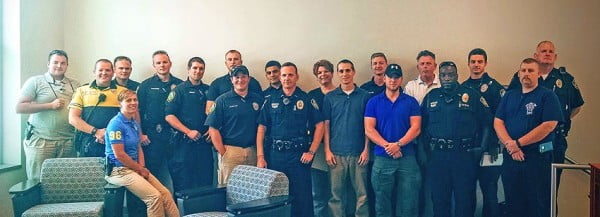Can Police Officers Become Peace Officers?
AKA Sorority Inc. & NAMI WC Answer the Question.
By Tracey Turner, CIT Training Coordinator & NAMI Member
The news has been filled with tragic law enforcement encounters. There is more than one cause but perhaps these tragedies can be traced back to poor training.
Nine years ago Asheville and Buncombe County law enforcement were as unprepared as many communities in the media today. The Asheville Chapter of AKA Sorority Inc., and the National Alliance on Mental Illness Western Carolina, our local affiliate, are partners in increasing public awareness about a law enforcement training program called Crisis Intervention Team training (CIT).
Here in 2006, two young men with mental illnesses were shot and killed by law enforcement. There was a public outcry.

In response to these tragedies, Rich Munger of Buncombe County government and Mona Cornwell of A-B Tech and NAMI, unbeknownst to one another, each called Lt. Sam Cochran of the Memphis Police Department. Memphis PD had developed a de-escalation model for encountering people with mental illness in crisis. It was the original CIT, which resulted from a 1987 shooting similar to the one in Asheville.
The Memphis mayor called together a task force of invested community members that included law enforcement, the heads of two university psychology departments and the local affiliate of the National Alliance on Mental Illness, NAMI. They developed a program that trained officers to approach an encounter with patience, using all the time necessary to de-escalate and calm the individuals that are in crisis with mental illness or substance abuse.
NAMI is the largest grassroots advocacy organization for people with mental illness in the country. NAMI is both for people who themselves live with a mental illness and family members and caregivers of people living with mental illness.
NAMI WC, offers weekly support groups for peers and twice a month support groups for families. NAMI WC also offers Family-to-Family, a nationally recognized class that teaches family members about mental illnesses, how to support their loved one living with mental health issues and the importance of care givers learning to care for themselves. We also offer educational meetings monthly and support groups at Copestone, Mission’s psychiatric unit, once a week.
NAMI WC has been a working partner in CIT since the initial Buncombe County task force was formed in 2007. NAMI is always a partner in CIT.
In April of 2008, CIT held it’s first training in Buncombe County. NAMI helped to establish the curriculum.
The first day of the training teaches officers mental illness diagnoses and substance abuse behaviors. With this backdrop, on Tuesday of the week long training, NAMI arranges for a day of site visits to such stops as A Hope and Neil Dobbins, ending the day at the VA.
Here is where the officers put names, faces and personalities to the diagnoses they learned about the day before. The humanizing begins.
On Wednesday, NAMI provides three peers to tell the stories of their mental illnesses and the ways in which it has altered their lives. Then family members tell their stories of the tragedy of watching a loved one go into and through their illnesses. The power of these people to change perceptions is amazing. You can feel the change in the officers.
Beginning that afternoon and for the two days following, officers do role-playing to learn the de-escalation skills for engaging with people in mental illness or substance abuse crisis.
CIT is considered a jail diversion program, meaning that the preferred outcome is getting the individual into a treatment facility and not to jail… with safety for all. Prior to CIT being established in our community, the most common outcome of a law enforcement encounter with people with mental or substance abuse illness was either taking the individual to jail or to the emergency department of a hospital.
Neither jails nor emergency departments are appropriate treatment environments for persons who are in mental illness or substance-abuse crises. Prompt and appropriate behavioral health treatment for persons in these kinds of crisis is more effective for those who need it and much less expensive than taking such persons to jails and emergency rooms. Inappropriate use of jails and emergency rooms is harmful to those who need specialized care and wastes the time and energies of law enforcement and medical professionals.
Too often in the United States, jails have become the de facto mental hospitals. Decades of a mass incarceration policy have resulted in the jailing of far too many persons whose addiction and other mental health issues have been criminalized.
CIT is a lifesaver. With 25% of law enforcement now trained, there have been no officer-related deaths of the mentally ill since CIT was begun here. The goal is 100% of officers trained. The need for fully trained law enforcement agencies is and will be growing as the Asheville and Buncombe County population ages studies show.
911 dispatchers are also trained in a shortened CIT training and know how to determine whether or not a CIT officer should be dispatched. When a family or individual needs CIT help… call 911, and always request a CIT officer.
Those who have previously been reluctant to call law enforcement can now know there is help for a mental illness or substance abuse crisis and that is CIT. It can be a life line.
NAMI Western Carolina is a proud community partner, helping to support both those living with mental illness or substance abuse issue and law enforcement.






